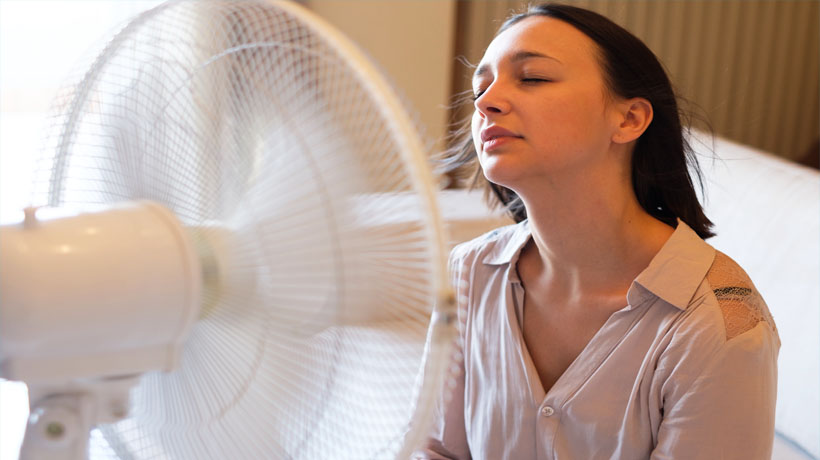Is it hot in here or is it just me? If you’re feeling a sudden internal warmth in your upper body, even when it isn’t hot outside, it may be just you. These hot flashes will usually be accompanied by splotchy redness in the upper body or face, perspiration, increased heartbeat, tingling in the fingertips and sometimes chills. Most women may be familiar with hot flashes as an annoying side effect of menopause. However, people of any age (and gender!) may experience them. Here are some other reasons why you may be experiencing them.
Prescription drugs
Many have reported recurring hot flashes after beginning common prescription medications such as certain opioids, antidepressants and medications for osteoporosis that continue with use. Be sure to consult with your doctor if you suspect any correlation as they will be able to recognize it, prescribe a new medication or help you to manage your dosage.
Your room is too hot
You may think there is something menacing behind your hot flashes, but there is a large possibility that it could simply be explained by the temperature of your surroundings. Even the slightest increase in your internal temperature has the potential to cause a hot flash. If they are becoming disruptive, try dressing in layers so that you can remove them when you begin to feel warm. Also, regularly consume cold beverages (but not too cold) to cool you down from the inside.
Reactions to diet
Some common triggers of hot flashes include caffeine, alcohol, sulfates and spicy foods. An unidentified food intolerance may also be the culprit. If you notice that hot flashes tend to occur around meal times, try speaking with a doctor or dietician about removing or limiting certain trigger foods from your diet.
Stress
One of the most common explanations of recurring hot flashes is anxiety and stress. When you are under stress, your body releases a hormone called adrenaline which causes increased blood flow and in turn, increased heat. Stress-relieving practices such as meditation, yoga and deep breathing can provide significant relief to stress-induced heat flashes. If the problem persists, speak to a medical professional about getting alternate anxiety treatment.
Thyroid issues
Hyperthyroidism, or an overactive thyroid, results in an excess of hormones which causes an unnatural spike in the metabolism. This spike leads to uncomfortable sweating and hot flashes. Other signs of an overactive thyroid include unexplained and dramatic weight loss, fatigue, racing heart and frequent urination. If you recognize any of these symptoms along with the hot flashes, talk to your doctor.
Sources:
https://www.mayoclinic.org/diseases-conditions/hot-flashes/diagnosis-treatment/drc-20352795
https://www.prevention.com/health/a20484754/6-common-causes-of-hot-flashes-that-arent-menopause/
https://www.healthline.com/health/menopause/hot-flash-remedies#1
https://www.healthcentral.com/article/what-causes-besides-menopause-hot-flashes-night-sweats
http://www.rockymountainwomenshealthcenter.com/blog/can-hot-flashes-be-caused-by-something-besides-menopause/
https://www.medicinenet.com/hot_flashes/article.htm



